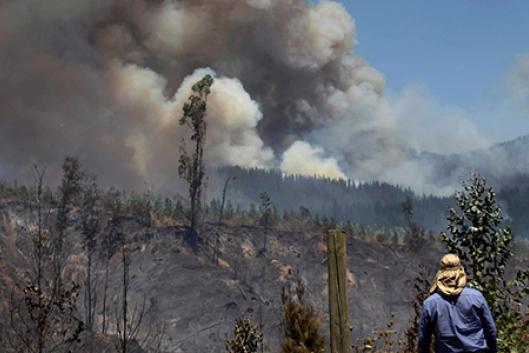The new year got off to a fiery start in Chile, as seen in the national and international news reports of the devastating forest fires raging across various regions of the country. These include the regions of Araucanía and Bío Bío, in central-southern Chile, where there are more than three million hectares of industrial plantations of exotic tree species. Over two million hectares of these plantations – primarily made up of pine and eucalyptus trees – are owned by the companies Arauco and Mininco, and have also been hit by the wildfires.
For defenders of the model of large-scale monoculture plantations of fast-growing three species, Chile is a “star” example. The plantation industry has been heavily promoted by the Chilean state not only through large subsidies, but also with strong military support. The industry needs and uses this support to deal with disputes with Mapuche indigenous people that have been ignited over land ownership, since the plantations have expanded into ancestral Mapuche land.
In addition to the land conflict with the Mapuche, large-scale tree plantations have led to a long string of disastrous impacts. There have been repeated reports of the clearing of native forests for their replacement by plantations, resulting in the loss of medicinal plants and sources of food, as well as wildlife; the enormous amounts of water required by these fast-growing tree species have affected surface and underground water resources and caused serious droughts; ecosystems have been polluted by the widespread use of chemical pesticides; rural communities have been effectively “fenced in” by plantations; rural roads have been destroyed by heavy machinery and trucks; plantations have taken over land previously used for livestock raising and agriculture, with a consequent loss of food sovereignty; they have invaded and occupied sacred sites; and they have contributed to an increase in rural emigration and poverty.
Now the outbreak of forest fires has demonstrated the fragility of the monoculture model. The director of Mapuexpress, Alfred Seguel, says that the responsibility for the rash of fires lies with the plantation companies, because the introduction of exotic species like pine and eucalyptus has created veritable deserts. Seguel also stressed that the potential fire hazards posed by plantations are increased by the presence of dead pine trees that have fallen prey to the Sirex wood wasp (Sirex noctilio) – and it just so happens that the areas where fires have broken out are the same areas that have been hit by wood wasp infestations.
In spite of all this evidence, the government's reaction has been to step up its support for the plantation companies, blaming the tragedy on Mapuche organizations and unleashing a wave of repression against them.
The Ethical Commission Against Torture (CECT-Chile) sent an open letter to President Sebastián Piñera to express its concern over the violent police operations being conducted against Mapuche communities, and particularly the fact that they are being carried out under the Anti-Terrorist Law, Law 18.134, created during the Pinochet military regime to repress opposition to the dictatorship. The Commission maintains that this law “does not comply with international standards in regards to human rights and obstructs minimum guarantees of due process,” and that “the arbitrary and discriminatory use of this legislation over the past decade has served to stigmatize the Mapuche people.”
The industrial tree plantation empire is collapsing, declared Alfredo Seguel. And like any empire, when faced with crisis, it responds with violence and the criminalization of protest. But the Mapuche people will keep up their resistance, in defence of their ancestral land.
ANAMURI, a Chilean indigenous women's organization, is calling for solidarity with the peasant community of Quillón in the Bío Bío region. The community is surrounded by pine and eucalyptus plantations, and people's houses and crops have been wiped out by the wildfires. To make a contribution, write to secretariag@anamuri.cl, visit the ANAMURI website at http://www.anamuri.cl, or call +562 672 0019
This article is based on information from the article “Chile: la caída del imperio forestal”, Alfredo Seguel, January 2012, Mapuexpress.net,http://www.mapuexpress.net/?act=news&id=8057; and the Letter to President Piñera from the Ethical Commission Against Torture (CECT-Chile), January 2012,http://notascect.wordpress.com/2012/01/09/carta-al-presidente-pinera-2/
